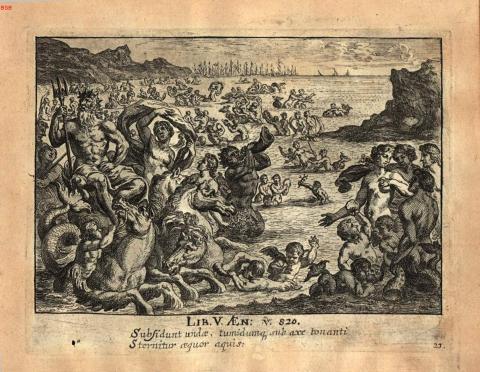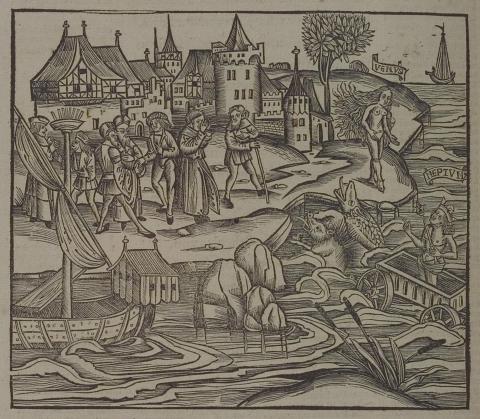CORE VOCABULARY
Sāturnius, a, um: adj. (Sāturnus), belonging to Saturn; Saturnian; sprung from Saturn; Saturnian, 4.372; subst., Sāturnius, iī, m., the son of Saturn, 5.799; Sāturnia, ae, f., 1. Daughter of Saturn, Juno, 1.23; 2. The city of Saturnia, built by Saturn on the Capitoline hill, 8.358.
domitor, ōris, m.: a tamer, 7.189; ruler, sovereign, 5.799. (domō)
fās, indecl. n.: divine right or law; duty, justice, 3.55; privilege, 9.96; as predicate with esse, permitted, lawful, proper, incumbent, 1.77, et al. (rel. to for)
Cytherēus, a, um: adj. (Cythēra), Cytherean; subst., Cytherēa, ae, f., the Cytherean goddess; Venus, 1.257.
fīdō, fīsus sum, 3, n.: to confide, trust, rely; freq., w. dat., 7.290; w. abl., 5.398; w. inf., dare, 5.69; p., fīdēns, entis, trusting, bold, confident, w. abl., dat., or gen., freq. (rel. to πείθω, persuade)
comprimō, pressī, pressus, 3, a.: to press together; repress, check, restrain, stay, 2.73. (com- and premō)
rabiēs, em, ē, f.: madness, frenzy, fury, fierceness, 2.357, et al.; of inanimate things, 5.802, et al.
nec or neque: (adv. and conj.), and not; neither, nor, 1.643, et al.; in prohibition, 3.394, et al.; neque (nec) — neque (nec), neither — nor, 5.21, et al.; nec — et, or -que, may be rendered neither — nor, 12.801; 2.534; nec nōn, and also, nor less, 6.183; nec nōn et, and also, 1.707.
Xanthus, ī, m.: 1. The Xanthus or Scamander, a river near Troy, 5.808, et al. 2. A small river in Epirus named by Helenus after the Trojan Xanthus, 3.350. 3. A river in Lycia, 4.143.
Simoīs, Simoentis, m.: a river which falls into the Scamander near Troy, 1.100, et al.
testor, ātus sum, 1, dep. a.: to testify, bear witness to, with acc. of object witnessed, 3.487; to call to witness, appeal to, with acc. of witness called upon, 2.155; invoke, 12.496; w. object omitted, adjure, implore, 3.599; declare, proclaim, 6.619; beseech (call to witness the offering), 11.559. (testis)
Aenēās, ae, m.: 1. A Trojan chief, son of Venus and Anchises, and hero of the Aeneid, 1.92. 2. Aenēās Silvius, one of the Alban kings, 6.769.
Trōius, a, um: (adj.), of Troy, Trojan, 1.119.
Achillēs, is (eos or ī), m.: the son of Peleus, king of Thessaly, and Thetis, daughter of Nereus, 1.468, et al.
exanimō, āvī, ātus, 1, a.: to deprive of life; p., exanimātus, a, um, without breath, breathless; disheartened; terrified, 5.805. (ex and anima)
impingō, pēgī, pāctus, 3, a.: to fasten upon; drive, dash against, 5.805. (1. in and pangō)
lētum, ī, n.: death, destruction, 2.134, et al. (cf. dēleō)
gemō, uī, itus, 3, n. and a.: to groan, 7.501; sigh, 1.465; bemoan, bewail, lament, 1.221; of inanimate things, creak, 6.413.
repleō, plēvī, plētus, 2, a.: to fill again; fill up, fill, 2.679, et al.
ēvolvō, volvī, volūtus, 3, a.: to roll out or forth, 5.807; unroll a scroll or volume; hence, (fig.), reveal, declare, 9.528.
possum, potuī, posse, irreg. n.: to be able; can, 1.242, et al.; to avail, have influence, power, 4.382. (potis and sum)
Pēlīdēs, ae, m.: 1. The son of Peleus, Achilles, 2.548. 2. Neoptolemus or Pyrrhus, grandson of Peleus, 2.263, et al.
congredior, gressus sum, 3, dep. n.: to step, go together; encounter, 1.475; join battle; proceed to battle, 12.13. (com- and gradior)
nūbēs, is, f.: a cloud, 1.516, et al.; storm, 10.809; the air, 12.856; (fig.), flock, multitude, 7.705.
cavus, a, um: (adj.), hollow, 1.81; concave, 8.599; arching, vaulted, 2.487; cavae manūs, the palms of the hands, 12.86.
īnferus, a, um: (adj.), below, lower; comp., īnferior, ius, lower; less distinguished, inferior, 6.170; superl., īnfimus or īmus, a, um, lowest, deepest, 2.419; inmost, 2.120; below, 4.387; lowest part, bottom of, 3.39; ex īmō, from the foundation, 2.625; īma, ōrum, n., depths.
struō, strūxī, strūctus, 3, a.: to place side by side or upon; to pile up; build, erect, 3.84; cover, load, 5.54; arrange, 1.704; like īnstruō, to form or draw out a line of battle, 9.42; (fig.), to plan, purpose, intend, 4.271; bring about, effect, 2.60. (rel. to sternō)
manus, ūs, f.: the hand, 1.487; freq.; (meton.), action, movement of the hand; work, art, handiwork, 3.486; prowess, heroic deed, action, 2.434; force, violence, 2.645; a collection of persons; a band, crew, troop; an army, 2.29; forces, 5.623; multitude, 6.660; pl., manūs, workmen, 11.329; dare manūs, to yield, 11.558; extrēma manus, the finishing hand or touch, 7.572.
periūrus, a, um: adj. (per and iūs), violating one's oath; perjured, forsworn, 2.195.
Trōia, ae, f.: 1. Troy, the capital of the Troad, 2.625, et al. 2. A city built by Helenus in Epirus, 3.349. 3. A part of the city of Acesta in Sicily, 5.756. 4. The name of an equestrian game of Roman boys, 5.602.
perstō, stitī, stātus, 1, n.: to continue standing; remain fixed, 5.812; persist, 2.650.
portus, ūs, m.: a port, harbor, haven, 1.159, et al; (fig.), 7.598.
accēdō, cessī, cessus (perf. ind., accēstis for accessistis, 1.201), 3, n.: to go or draw near to; approach, with acc. alone, 1.307. (ad and cedo)
Avernus, ī, m.: Avernus, a lake near Naples, between Baiae and Cumae, in Campania, now Lago d’ Averno. Near it was one of the entrances to Hades; hence, the lower world, Avernus, 6.126; portus Avernī, the harbor of Cumae, near Avernus, 5.813. (ἄορνος, birdless)
gurges, itis, m.: a whirlpool, gulf, 3.421; flood, 2.497; wave, billow, 3.564; rolling, raging sea, abyss, 1.118; sea, ocean, 7.704.
multī, ōrum, m.: subst., many men, many, 2.124, et al.
permulceō, mulsī, mulsus or mulctus, 2, a.: to stroke; calm, soothe, cheer, 5.816.
dictum, ī, n.: a thing said; word, 1.197; command, precept, injunction, 1.695; promise, 8.643. (dīcō)
genitor, ōris, m.: he who begets; father, sire, 1.155, et al. (gignō)
spūmō, āvī, ātus, 1, n. and a.: to foam, 3.534, et al. (spūma)
frēnum, ī, n.; in the pl. sometimes frēnī, ōrum: a bit, 4.135; bridle, reins, 3.542; (fig.), 6.100.
ferus, ī, m.: a wild beast; in gen., a brute; a beast, 2.51; courser, steed, 5.818; stag, 7.489.
effundō, fūdī, fūsus, 3, a.: to pour out or forth; shed, 2.271; throw, cast out, 7.780; cast, 6.339; overthrow, 11.485; bring out, 9.68; unbind, dishevel, 4.509; dissolve, 2.651; let loose, throw out, 5.818; spend, lose, waste, 5.446; of words, utter, 5.780; (pass.), effundī, dart, 5.145; flow, 6.686. (ex and fundō)
habēna, ae, f.: a rein, 1.63, et al.; strap, thong, 9.587; whip, 7.380; immissīs or laxīs habēnīs, with all the reins let out, without restraint, unchecked, 5.662; pressīs or adductīs habēnīs, with tightened reins, 12.622. (habeō)
caerulus, a, um: (adj.), dark blue, 2.381; sea-colored, azure, 5.819; dark; black, 3.64; subst., caerula, ōrum, n., the dark blue waters; the sea, 3.208.
volō, āvī, ātus, 1, n.: to fly, 1.300, et al.; of rumor, to be spread rapidly, noised or spread abroad, 3.121.
subsīdō, sēdī, sessus, 3, n. and a.: to sit or settle down, 12.492; to sink down, fall, subside, 5.820; remain, 5.498; subside, remain below, be lost or disappear, 12.836; (w. acc.), to lie in wait for, remain, or watch for the spoils of, 11.268.
tumidus, a, um: adj. (tumeō), swollen, 1.142; distended, 10.387; elated, 9.596; incensed, angry, 6.407; causing to swell, swelling, 3.357.
axis, is, m.: an axle; synecdoche, car, chariot, 5.820; the axis of the heavens, the sky, the heavens, 4.482; the pole; the north pole, the north.
tonō, uī, 1, n. and a.: to thunder, 3.571, et al.; of speech, 11.383; (with acc.), utter, invoke with a loud voice, thunder forth, 4.510.
sternō, strāvī, strātus, 3, a.: to spread out, spread, 1.700; stretch on the ground, strike down, slay, 1.190; cast down, prostrate, devastate, 2.306; make level, smooth, calm, 5.763; spread, cover, 8.719; strew, litter; overthrow, conquer, 6.858; pass. (in middle sense), sternor, ī, to stretch one's self, lie down, 3.509.
vāstus, a, um: (adj.), empty, void, wild, waste, 9.323; vast, unbounded, 1.118; huge, enormous, immense, 3.647; deep-, vast-, sounding, 1.245.
nimbus, ī, m.: a violent rain; storm, tempest, 1.51; a black cloud, thunder-cloud, cloud, 3.587; a bright cloud; the nimbus surrounding a god, 2.616; cloud of smoke, 5.666; a multitude, 7.793.
immānis, e: (adj.), vast, huge, immense, 1.110; wild, savage, barbarous, 1.616; cruel, ruthless, 1.347; unnatural, monstrous, hideous, 6.624; (adv.), immāne, wildly, fiercely, 12.535.
cētus, ī, m.; cētos, ī, n.; pl.: cētē, κῆτος, whales, sharks, sea-monsters, 5.822.
senex, senis: (adj.), old, aged, hoary, 7.180; (comp.) senior, ōris, older; very aged, 5.179; hoary, 5.704.
Glaucus, ī, m.: a fabled fisherman of Boeotia, one of the Argonauts, who was transformed into a sea-god, 5.823. 2. The father of Deiphobe, the Cumaean sibyl, 6.36. 3. A Lycian prince, allied with Priam, and slain by Ajax, son of Telamon, 6.483.
chorus, ī, m.: a dance in a circle; a dance; a company of singers or dancers, choir, train, 1.499; band, troop, 5.581; festival, 11.737.
Īnōus, a, um: adj. (Īnō), pertaining to Ino, daughter of Cadmus and mother of Melicertes or Palaemon; Inoan, 5.823.
Palaemōn, onis, m.: Palaemon, a sea-god, son of Athamas and Ino; also called Melicerta, 5.823.
Trītōn, ōnis, m.: Triton, a son of Neptune, 1.144; pl., Trītōnēs, um, m., sea-gods of the form of Triton, 5.824.
Phorcus, ī, m.: a sea-god, son of Neptune or Pontus and Gaia, 5.240; a Latin patriarch, 10.328.
laeva, ōrum, n.: the left-hand places; waters or waves on the left hand, 5.825.
Thetis, idis or idos, f.: Thetis, daughter of Nereus and Doris, married to Peleus, of Thessaly, by whom she became the mother of Achilles, 5.825.
Melitē, ēs, f.: Melite, a sea nymph, 5.825.
Panopēa, ae, f.: Panopea, a sea-nymph, daughter of Nereus, 5.240.
Nīsaeē, ēs, f.: one of the Naiads.
Spīō, ūs, f.: Spio, one of the Nereids, 5.826.
Thalīa, ae, f.: Thalia, an Oceanid or sea-nymph, 5.826.
Cȳmodocē, ēs, and Cȳmodocēa, ae, f.: Cymodoce, a Nereid, 5.826; 10.225.


